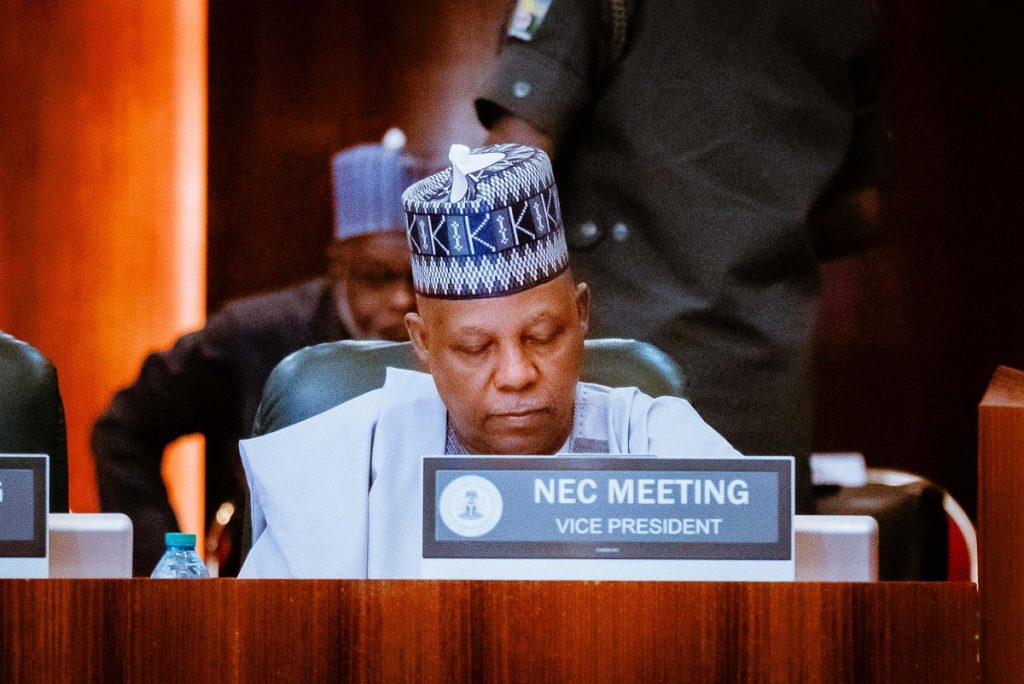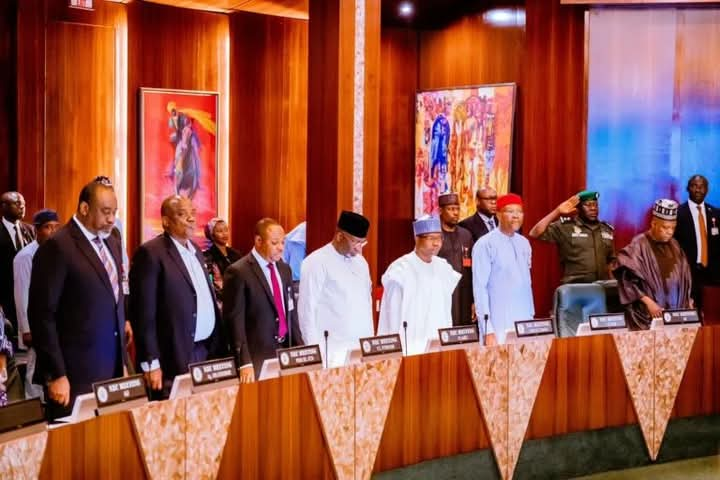NEC endorses $90bn agribusiness, approves textile development board

The National Economic Council (NEC), chaired by Vice President Kashim Shettima, has approved a series of far-reaching economic initiatives. They includes the establishment of a Cotton, Textile and Garment Development Board and the adoption of a national agribusiness and livestock transformation strategy expected to generate up to $90 billion by 2035. These resolutions were reached during the 149th NEC meeting held on Thursday at the Presidential Villa, Abuja. The Council, comprising the 36 state governors, key federal ministers, and the Governor of the Central Bank of Nigeria, also observed a minute of silence in honour of victims of recent attacks in Benue and Plateau States. Addressing council members, Shettima said the newly approved initiatives reflect the administration’s focus on economic revitalisation and long-term stability. READ ALSO: NEC pushes for overhaul of livestock practices amid rising violence “We must rise above partisanship and focus on building a nation that delivers for all,” Shettima stated, urging leaders to act decisively and avoid mere rhetoric. NEC greenlit the formation of the Cotton, Textile and Garment Development Board, which will operate under the Presidency and be funded through the textile import levy collected by the Nigeria Customs Service. The board will serve as the regulatory and developmental authority for the sector, aiming to revitalise an industry once central to Nigeria’s economy. “With cotton capable of thriving in 34 states, our continued reliance on imports is unacceptable,” the Vice President noted. “Our goal is not just regulation—it is a revival. This is an opportunity to re-industrialise and restore pride in local production.” Also endorsed was the National Livestock Growth Acceleration Strategy (NL-GAS), inherited and expanded from the existing National Livestock Transformation Plan. READ ALSO: Shettima urges National Assembly to prioritise unity, national development The initiative is designed to modernise animal husbandry, promote ranching, and reduce conflicts between farmers and herders. The livestock strategy targets $74–$90 billion in sectoral growth by 2035 and prioritises investments in animal health, water resource management, feed and fodder production, breed improvement, and statistical data systems. NEC encouraged states to establish counterpart ministries to align with the Federal Ministry of Livestock Development and unlock investor interest in transforming Nigeria into a red meat export hub. The Council also approved the transfer of N100 billion previously committed by NEC to support livestock modernisation, and endorsed stronger collaboration with state governments, private investors, and foreign partners. In line with the federal government’s food security agenda, NEC approved the formal establishment of the Green Imperative Project (GIP) national office in Abuja and regional offices across the six geopolitical zones. The GIP aims to boost agricultural productivity and drive inclusive growth. A presentation by the Minister of Education highlighted the federal government’s plan to equip five million Nigerian youths with industry-relevant skills by 2030. READ ALSO: Tinubu inaugurates committee for technology-driven National census NEC endorsed the recommendations, with state governors urged to adopt the Technical and Vocational Education Training (TVET) programme to tackle youth unemployment and drive entrepreneurship. The Accountant-General of the Federation reported that, as of April 2025, the Excess Crude Account stood at $473,754.57, the Stabilisation Account had a balance of N63.5 billion, while the Natural Resources Development Fund held N72.8 billion. In his closing remarks, Vice President Shettima stressed the need for action over policy formulation, saying, “We are not merely responders to crises. We are architects of a sustainable future.” He proposed that NEC conduct field visits through its Implementation Monitoring Committee to evaluate progress and ensure that citizens feel the real impact of government decisions.
NEC pushes for overhaul of livestock practices amid rising violence

The National Economic Council (NEC) has called for a complete rethink of Nigeria’s traditional livestock rearing practices. NEC cited the urgent need to adopt modern, sustainable systems to curb ongoing conflicts between farmers and herders. The position was taken during NEC’s meeting on Thursday at the Presidential Villa, Abuja, chaired by Vice President Kashim Shettima. The session followed renewed outbreaks of deadly violence in parts of the country, including Plateau, Benue, and Kwara States, where dozens of residents were recently killed in attacks by suspected armed groups. Speaking after the meeting, Bayelsa State Governor, Douye Diri said the council agreed that the outdated model of animal husbandry must be replaced with more structured and modern approaches. READ ALSO: Shettima chairs NEC as Rivers sole administrator attends “We can no longer afford to operate in the past. Council strongly believes that modernising livestock production is not just necessary—it’s long overdue,” Diri stated. NEC attributed the persistence of farmer-herder clashes to the current nomadic system of livestock movement, which continues to drive land-use disputes and escalate tensions in agrarian communities. Governor Diri also pointed to the recent establishment of the Federal Ministry of Livestock Development as a positive step. He added that the ministry had unveiled a strategic plan—the Accelerated Livestock Development and Growth Strategy—aimed at transforming the sector into a $70–$90 billion industry by 2035. Violence between pastoralists and farming communities has become a recurring crisis in Nigeria’s Middle Belt, where disputes over land, identity, and dwindling resources have grown more volatile. READ ALSO: Shettima calls for interagency synergy to drive business reforms In Plateau State alone, recent attacks left more than 100 people dead in just one week, prompting local officials to describe the carnage as ‘genocide’ allegedly orchestrated by terrorist networks. While Plateau authorities blamed the killings on external actors, some analysts argue that inflammatory rhetoric often oversimplifies the complex, localised nature of the conflict. Root causes include competition over land, weak state presence, and unresolved grievances between ethnic and religious communities. The Fulani, who dominate Nigeria’s nomadic herding population, are frequently at the centre of these tensions. In regions like Benue and Plateau, predominantly Christian farming populations have accused Fulani groups of launching coordinated attacks. However, Fulani leaders say their communities are also targets of retaliatory violence and discrimination. Long-standing land disputes, aggravated by climate change, population growth, and political rivalries, continue to fuel unrest. Limited access to pasture and water has turned once-shared resources into flashpoints for bloodshed. Security experts warn that without stronger governance, better land-use policies, and sustainable livestock practices, these conflicts will persist. NEC’s latest push for reform signals a recognition at the highest levels of government that Nigeria’s agricultural future depends on breaking this cycle of violence.



